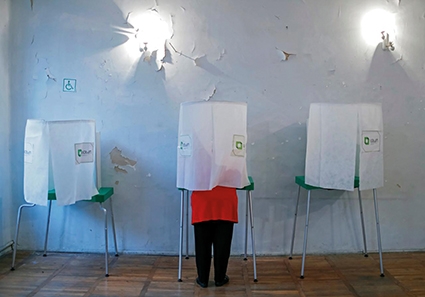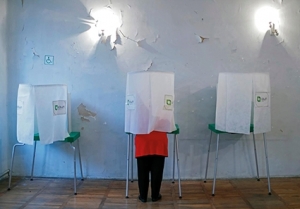Presidential Elections Polling Stations Were ‘Free’ and ‘Fair’
International observers at the polling stations during the presidential elections on October 28 released their findings this week. Supported by local translators, a team of 26 observers from Silba, an initiative for dialogue and democracy, monitored 116 polling stations in Tbilisi and 26 in Rustavi.
Ranking polling stations on a scale from very bad to very good, the observers found the voting procedures to be generally appropriate and in accordance with Georgian law. They rate 79% as very good, 20% as good and 1% as bad. No polling stations were described as being very bad.
However, the observers did notice several instances when party observers present at the polling stations interfered in the voting process. On three separate occasions, party observers interfered and argued in order to allow voters, who were initially turned away from the polling station, to cast their vote. Furthermore, party observers even instructed people on who to vote for on two occasions. Party observers also checked voters’ IDs, documenting the information, several times. In one such instance, the party observer was reported to actively try to influence voters and ignoring demands from the chairman of the polling station to be seated.
Party-affiliated people were regularly observed to be present at polling stations. In at least 9 of the observed polls, the international observers reported seeing a group of people outside the entrance “taking notes”. Third parties mentioned that they would call voters who didn’t attend to try and persuade them to come and vote for a specific party, although Silba found no conclusive evidence of this.
Polling stations could have been made more inclusive. Observers found that 42% of polling stations had challenging or no access for disabled people. When asked, a PSO explained that disabled people could apply to make sure they were assigned to an appropriate polling station. In 79% of stations, election materials were not available in minority languages. Moreover, observers witness a homeless voter being denied the possibility to vote as he lacked an address.
The report concludes that the presidential elections ‘were conducted in a free, fair and transparent manner.’ The most significant irregularity was party-affiliated people taking notes. Although not strictly illegal, it may show the pressure applied to voters by certain parties.
Georgian Deputy Interior Minister Natia Mezvrishvili reported that 15 individuals were charged with election-related violations. The presidential candidate will be decided in December in a second round of voting between Salome Zurabishvili and Grigol Vashadze.
By Amy Jones
Image source: Reuters












